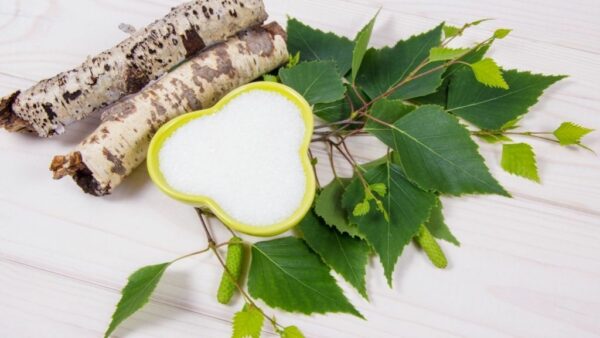Health-conscious consumers don’t eat granulated sugar: they use natural sugar substitutes, Xylitol or Erythritol to sweeten their food, drinks, and even their cakes. Is Xylitol birch sugar, or is it something else? Is there a difference between Xylitol and Erythritol? Make a journey of discovery to the exciting world of natural plant-based sweeteners!
In this article, we discuss all the positive properties of Xylitol and the advantages of its consumption. You can also learn about the difference between Xylitol, Erythritol and birch sugar.
- What kind of sugar is Xylitol?
- How is Xylitol used?
- The positive impact of E 967 on our health
- The potential risks of Xylitol consumption
- Xylitol or Erythritol?
What kind of sugar is Xylitol?
Xylitol is sugar alcohol extracted from plants. It is a plant-based, sugar-free natural sweetener naturally present in fruits and vegetables. Xylitol is produced from plant fibres, xylose, during industrial production. What plants contain xylose in the highest amount? Birch sugar is on the top of the list, which explains why many people think that Xylitol is identical to birch sugar. In the beginning, Xylitol was indeed produced from xylan – the fibres of birch wood – today they produce it from maize fibres. Real birch sugar produced from a natural source is hardly available these days. There is also a large amount of xylose in the seed coat of wheat, oat, rice and even in the shell of almonds.
How is Xylitol used?
The shape and taste of Xylitol are similar to that of refined beet sugar. It has no aftertaste: it creates a pleasant, cool sensation on our tongue when tasted. Xylitol should be applied in the same doses as beet sugar. If the recipe says 10 decagrams of granulated sugar, you will also need 10 decagrams of Xylitol. It is important to note that Xylitol cannot be used as a sugar substitute in two cases: for caramelization and for making leavened dough. When activating the yeast in milk with a bit of sugar, sugar reacts to the yeast – Xylitol is not able to do the same.
The positive impact of E 967 on our health
Xylitol rapidly became popular among people on a diet and those suffering from diabetes. Anyone who wants to live a healthy life considers using Xylitol as a sweetener. The plant-based sweetener can also be used for canning fruits and making jams or syrups.
- Xylitol is a sugar substitute with a low glycemic index of 7. It is absorbed slowly and doesn’t raise our blood sugar level – in fact, it may even help keep it on a normal level.
- Our body doesn’t require insulin to break down Xylitol, so it can be consumed by diabetic people.
- Xylitol has an alkalizing effect, so it can be part of a candida diet or a detox program.
- It contains 40% fewer calories and 25% fewer carbohydrates than granulated sugar, so it is useful for preventing obesity and sugar addiction.
- Xylitol also has a good impact on our teeth, as it prevents dental caries (by preventing bacteria from sticking on the teeth), and as a result, reduces plaque formation.
- Also, it aids the acid-base balance of our mouth, making it more resistant to harmful bacteria.
The potential risks of Xylitol consumption
Similarly to the consumption of any other substances, it is important to consume Xylitol in a moderate way. Although plant-based sweeteners are healthier than traditional beet sugar in every respect, it is still recommended to get our bodies used to this new sugar substitute. In the beginning, Xylitol consumption may cause diarrhoea. We can also experience this side effect if we consume more than what our body tolerates.
It is not recommended for people with fructose malabsorption or fructose intolerance to consume Xylitol, as it may slow down the absorption of fructose in the intestines significantly.
Finally, an important note: it is prohibited to give Xylitol (or any food sweetened with Xylitol) to dogs, as it causes hypoglycaemia or hepatic impairment, which can be lethal.
Xylitol or Erythritol?
Xylitol and Erythritol are both sugar alcohols; they are natural, plant-based sweeteners. Xylitol is extracted from birch wood and maize fibres, while Erythritol can be found in melons, pears, grapes as well as in food products made by fermentation such as wine or cheese. The code number is E-967 for Xylitol and E-968 for Erythritol. Diabetic people and those who are on a diet can consume both. They might cause diarrhoea depending on the body of the individual. Neither of these substances caramelises, and they cannot be used to activate the yeast.
Differences
- The most significant difference between these two sugar substitutes is that Erythritol is less sweet. While the sweetening effect of Xylitol is the same as that of birch sugar, Erythritol is 40% less sweet than granulated sugar.
- There is another difference in terms of calories: Xylitol contains 2.4 calories per gram, while in the case of Erythritol, this amount is 0.2.
- As for the much-mentioned glycemic index, it is 7 in the case of Xylitol and 0 for Erythritol.
- Xylitol is absorbed in the large intestines and Erythritol in the small intestines; the excess amount exits the body in the form of urine.
By using Xylitol, a plant-based natural sweetener, you can do a lot for your health. You can end your sugar addiction, and you will not burden your body with excess calories either. If you can, you should definitely switch to Xylitol!


